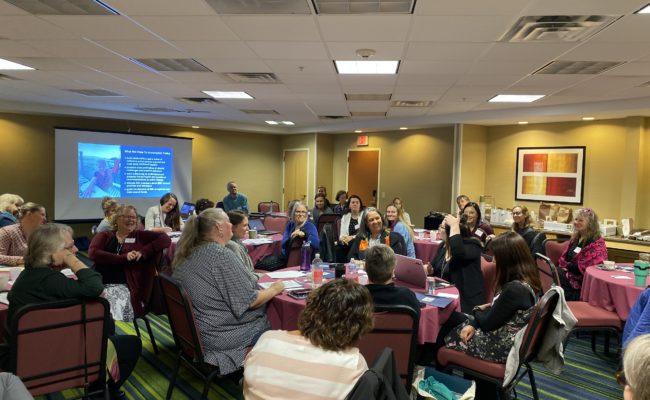
October marks the time in our work cycle where we bring together the SAC with Regional Leadership to share both challenges and creative solutions. This meeting helps regional and state partners to build relationships and a sense of collective action, so that we may all work together to best serve Vermont’s young children.
Executive Director Morgan Crossman set the stage for the day along with SAC Co-chairs, with reflections on the impact of state and local partners working for collective impact, our charge under Act 104, and the vision for BBF’s work. With that foundation, the SAC presented recommendations to the group on its two key priority areas: Early Childhood and Family Mental Health, and Supporting the Early Childhood Workforce.
The meeting then broke into smaller groups for some guided discussion about the two key recommendation areas. Meeting attendees were encouraged to choose either topic area and move among groups if desired. The result was robust discussions of best practices that come from communities for both the mental health and the workforce support topics. By sharing practices, the meeting served one of its key purposes of regional work informing statewide policy.
Early Childhood and Family Mental Health Discussion
The Earl Childhood and Family Mental Health discussions included some things that are working well today. The rollout of Early Multi-Tiered Systems of Support has been well received and successful, and the groups advocated for expanding that program further. There was also acknowledgement that CIS is an important piece of the system serving children, but that additional funding is needed to help it reach its full potential.
There were also some areas for improvement identified. Creating more integration across the system that serves children and families facing mental health challenges would improve the system. Today there are many programs and services available, but they often don’t talk to one another or are not aware what each other are doing.
It was also suggested that the system needs to expand in a way that includes pediatricians more. One idea was that pediatricians have a social worker on staff for all well child visits, so it becomes the norm and the doctor is not making a judgement call about who needs services and who doesn’t.
Finally, investment in reducing economic suffering would also help to reduce the need for mental health supports.
Supporting the Early Childhood Workforce Discussion
The lack of applicants for openings is significant, and tied to compensation. There was much talk about how to structure compensation in a way that is fair to teachers but is also manageable for the centers that employ them. Further, the idea of a scholarship program to pay for educational needs for the workforce was raised as an immediate way to provide financial support to the workforce.
Sharing hubs, where organizations can pool resources for buying and operational functions such as HR, are taking shape. A really important piece of this work will be a substitute teacher pool. It’s a challenge because subs are a precious resource and people are worried that if they share their good subs they will not be available. But this piece will be an important support for the child care workforce. There was also discussion of creative thinking around who would be a good substitute teacher and how to reach those populations in order to expand the pool of qualified substitute teachers.
The meeting closed with reflections and take-aways from the day’s conversations. In November, the SAC will meet on Monday, November 25 from noon to 3 pm in Williston.


